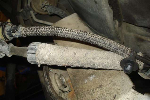chefduane
Texas Elite Explorer
- Joined
- January 22, 2013
- Messages
- 1,338
- Reaction score
- 81
- Location
- TEXAS!
- City, State
- Plano, TX.
- Year, Model & Trim Level
- None: SOLD 9/16
All engines require maintenance. Some more, some less. Is a BMW 755i junk because it requires more than regular maintenance? Is it junk because it is more expensive to own? As long as it is agreed that there are exceptions to every rule, then the rule is proven incorrect.
I think there is a thread somewhere about high mileage SOHC's that prove the 'junk' theory completely wrong. If you don't like the SOHC because you perceive it is too expensive, requires more maintenance, and you think it is more costly, then don't buy one. If I had a choice between a V8 or a SOHC V6 now, I go with the V8. Does that mean the V6 is junk? Certainly not, and calling it junk would be ridiculous.
PS: While I am not rich, I do pretty well. And I do my own maintenance. I don't call the SOHC junk. So that theory is also off base.
I think there is a thread somewhere about high mileage SOHC's that prove the 'junk' theory completely wrong. If you don't like the SOHC because you perceive it is too expensive, requires more maintenance, and you think it is more costly, then don't buy one. If I had a choice between a V8 or a SOHC V6 now, I go with the V8. Does that mean the V6 is junk? Certainly not, and calling it junk would be ridiculous.
PS: While I am not rich, I do pretty well. And I do my own maintenance. I don't call the SOHC junk. So that theory is also off base.










